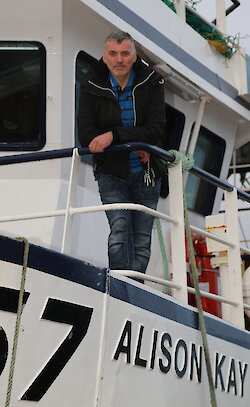Skipper takes issue with environmentalists on trawling

James Anderson of the Alison Kay (LK 57) believes the claims made by environmental groups about the catching of bottom-dwelling fish are wildly exaggerated.
In part, his view is the product of almost 30 years’ experience as a trawlerman fishing the same grounds.
But it is increasingly supported by evidence, most recently in an article by Dutch scientists in the journal Proceedings of the Royal Society of Biological Sciences.
One of the authors, Daniel van Denderen of the Wageningen Institute for Marine Resources and Ecosystem Studies, said that while trawling removed fish such as large crustaceans and shellfish, this is fortunate for smaller, softer species in the sandy seabed, such as worms, which with fewer predators flourish.
Since the smaller species tend to be the main source of food for fish, the overall effect is more marine life. "Fish persist at trawling intensities where they would have gone extinct otherwise," he said.
Mr Anderson said: "We fish the same seabed all the time. We have been doing that since I left the school.
"You don’t just ruin a place and move on - if that was the case the fishing would have been finished a long time ago.
"Flugga is the area we have fished with the Alison Kay basically since we got the boat. It’s the same tows, we just shift around a bit with the seasons.
"The fishing is as good now as I can ever remember - we’ve never caught so much fish so quickly - and quality fish too."
He added: "But of course I’m a fisherman and the environmental NGOs will say, ‘oh he would say that, wouldn’t he’. So it’s good to see some scientific backing for what we see on the grounds - and I hope more work will be done on this."
Mr Anderson said he was not opposed to cordoning off areas of seabed to protect sensitive marine ecosystems, temporarily or permanently if necessary.
"If you get a lot of small cod, for instance, that hang around an area, it’s maybe beneficial to say ok, we’ll leave that bit. I don’t mind doing a bit of that. But when you get the more extreme ‘trawling is bad per se’ stuff, there are a lot of arguments against that.
"I think the idea that you are destroying and you move on - I have seen NGOs making the point that an area something like half the size of Brazil is destroyed by trawling every year and you move on - that is just nonsense."
Leslie Tait, chairman of Shetland Fishermen’s Association, said: "There seems to be a general assumption that bottom trawling takes place in all areas of the seabed. This is far from the truth. In any one year only around 20 per cent of the area around Shetland is fished, and over the previous six years only 40 per cent of the area in total. This shows that the same areas are productive year on year.
"I believe these figures to be similar to the whole North Sea and it is heartening to see some reality from the Dutch scientists.
"Bottom trawling can in many ways be likened to farming, only a lot less harmful as no pesticides are used, buy we hear no cries to ban farming."